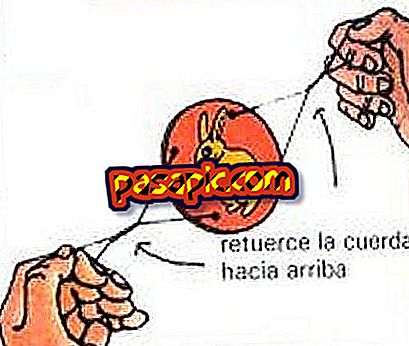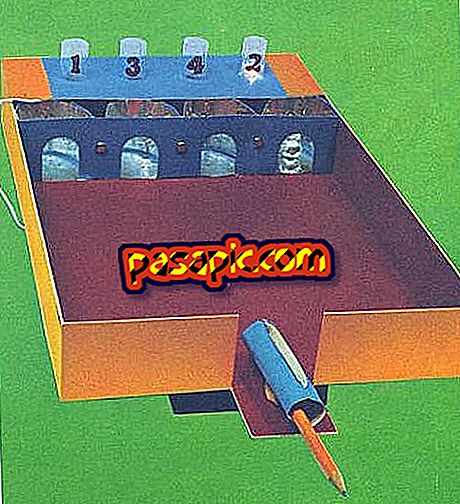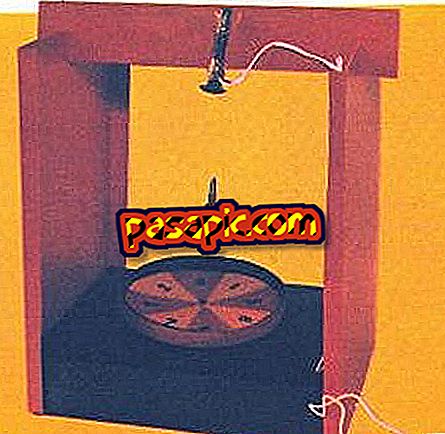How to remove intestinal worms in dogs

One of the most worrying problems in your pets are the internal and external parasites, since they can be a problem for their health but also for yours, because there are internal parasites that lodge inside your pet and that They can transmit diseases to you too.
There are five types of worms that affect a dog : hookworms, whipworms, tapeworms, nematodes and heartworms. The most frequent are tapeworms and nematodes, which can be identified in your dog's feces.
To prevent this from happening there are a series of preventions in addition to treatments if you have noticed that your dog has already contracted intestinal worms. In this article we help you to prevent and treat this problem, so we recommend you keep reading if you want to know more about how to eliminate intestinal worms in dogs .
Symptoms of intestinal worms in dogs
When your dog has worms, there are certain symptoms that can tell you that you definitely have this problem. Among the main symptoms of worms in dogs are:
- A constant itching and you can even see that your dog crawls and rubs his anus on the ground, in addition to nibbling in the area.
- Vomiting
- Chronic diarrhea.
- Anemia.
- Loss of coat shine and hair loss.
- Abdomen dilated in puppies.
- Swollen abdomen in an advanced process of infestation due to gases produced by worms.
- Thinning because the parasites feed on the nutrients of your dog.
- Blood in the stool. In front of this symptom you should take your dog to the vet as quickly as possible.
With any of these symptoms, and even more so if they are persistent, it will be necessary to go to the veterinarian to examine your pet since their health could be in danger.

Treatment for intestinal worms in dogs
The treatment of all kinds of parasites is to apply an antiparasitic, and although there are also home remedies to make this problem disappear, which we will explain later, it is always recommended to visit the veterinarian to prescribe the antiparasitic that best suits the type of parasite that has invaded your dog.
Under no circumstances is it recommended to buy an antiparasitic that has not been prescribed by a veterinarian, as there have been cases where they have caused allergies or there are problems by giving an excessive or insufficient dose to a dog.
The antiparasitics that exist are usually compressed, sprays, pipettes, oral paste or injectable, but those indicated for internal intestinal parasites, such as worms, are almost always compressed since they are the most effective against this. The veterinarian will check your dog and will most likely recommend a stool test (stool) to see which parasite is really affecting your pet's intestine. Sometimes a blood test is also recommended, as there are intestinal parasites that affect other organs, such as the heart. After this, it will give you the proper antiparasitic tablet treatment and about ten days later it will repeat it again. You will have to check the dog's feces to see if the worms have disappeared and go back to the vet to make sure everything is normal and your dog is out of danger. In some cases it is necessary to apply a third treatment, which will decide the veterinarian you go to after a correct revision.

Home remedies for intestinal worms in dogs
As we mentioned before, there are natural remedies whose properties can expel the intestinal worms of your dog. You can give these foods to your dog until it is noticed that he no longer has parasites. It is important not to overdo it and before any symptom of discomfort in your dog go to the vet. These home remedies for the worms of dogs are the following:
- Gentian: this herb can be used to eliminate these unwanted parasites thanks to its anti-inflammatory and antiseptic properties because it strengthens the digestive system. For this to be effective, you must boil water and add a spoonful of gentian root powder, which you can find in any herbalist's shop. We will have to wait for 5 minutes to cook and then offer it to your dog twice a day for 7 days.
- Garlic: is one of the best known home remedies to eliminate intestinal parasites, but remember that it can be toxic if it is administered in large quantities, so it is recommended to take a single clove of garlic, crush it and add it to some your meals Here we explain more about How to deworm a dog with garlic.
- Pumpkin seeds: this is a very effective remedy against intestinal worms. Add for every 5 kg of your dog's weight a small spoonful of ground pumpkin seeds ground. Also these seeds are good for your fur so you will not have to worry, because in no way will harm your health.
- Pineapple: this fruit is great to combat this type of problem as it eliminates worms quickly. You will not have to give too much, so with a few pieces will be enough. You can also offer the juice of this fruit mixed with food.
- Black walnut: this is a very bitter substance and can irritate the stomach of your dog, so it is advisable that you administer this remedy in alarming cases of intestinal worms, under the guidelines of a veterinarian and always in small quantities.
How to prevent intestinal worms in dogs
Intestinal parasites pose a risk to human health, as they can transmit diseases through the feces of the infected dog. In addition, larvae of the worm can penetrate your skin and although it is rare it can happen, so it is important not to walk barefoot at home and take great care that the feces do not have direct contact with the skin.
To prevent intestinal worms in dogs a series of measures that must be carried out:
- The first deworming of a puppy must be done when it reaches its first month of life. It must be dewormed both internally, with a tablet or oral paste, and externally. Keep in mind that pipettes can not be applied to puppies until 4 or 5 months of life so the vet will tell you what to do, which is usually dewormed externally with a spray suitable for him. In this other article we explain more details about when to start worming a puppy.
- From the first deworming of your dog, you must keep track of all your deworming. It will be necessary to deworm your furry periodically internally and externally. The veterinarian will give you the guidelines indicated for this and you will have to comply with them if you want to avoid this kind of problems.
- You should avoid giving your dog raw viscera, as they can be carriers of certain intestinal parasites.
- You can make your hairy a stool analysis often to detect the parasites as soon as possible in case you have contracted them and prevent them from spreading.
- If the dog does his home needs, clean them as quickly as possible since it is one of the main centers of transmission of intestinal parasites.
- Do not let your dog smell too much or lama stool from other dogs in the street, because it could be infected if the other dog was infected, although if you meet the deworming schedule of your dog you do not have to get it even if there are eggs in the stool of the other dogs.



